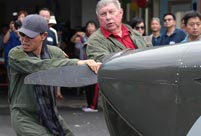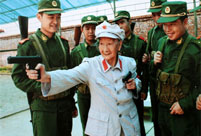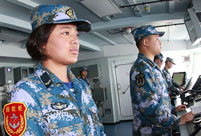

Amid a rising tide of worries over protectionism and anti-globalization sentiment, Chinese President Xi Jinping's substantial backing for free trade and economic globalization, demonstrated during a five-day trip to Peru, has injected much-needed confidence into the world.
Xi attended the 24th Asia-Pacific Economic Cooperation (APEC) Economic Leaders' Meeting on Saturday and Sunday in Peru's capital Lima, and later paid his first state visit to the Latin American country since 2013.
"REAL STAR" AT APEC ON OPEN ECONOMY
Speaking at the 24th APEC Economic Leaders' Meeting on Sunday, Xi highlighted the APEC's role as a pioneer, leader and trailblazer of economic cooperation in the Asia-Pacific and the world at large, and called on APEC members to leverage the Asia-Pacific's role as a growth engine and work for an innovative, invigorated, interconnected and inclusive world economy.
At the high-level gathering of APEC economic leaders, Xi urged the APEC economies to stay committed to pushing economic globalization forward, increasing openness in the Asia-Pacific economy, breaking bottlenecks in regional connectivity and blazing new trails in reform and innovation.
Citing the blueprint for strong, sustainable, balanced and inclusive world economic growth produced by the G20 Hangzhou Summit in September, the Chinese president said it embodies the spirit of partnership to jointly rise to challenges as well as the commitment to common development.
"Instead of coming to a stop because of the temporary difficulties, we need to continue our involvement in economic globalization. What is important is to combine it with our respective development practices, strive to ensure equity and justice, and steer it towards a more inclusive and mutually beneficial direction," he said.
On the building of a Free Trade Area of the Asia-Pacific (FTAAP), which was launched at the 2014 APEC meeting in Beijing, Xi hailed the smooth completion of the collective strategic study this year, saying it marked a new phase in FTAAP development.
"We need to stick to our agenda and take more effective actions to realize the FTAAP at an early date, thus bringing about an Asia-Pacific economy with greater openness," said the Chinese president.
Calling on APEC members to take more collective and individual actions to implement the Connectivity Blueprint for 2015-2025 adopted in Beijing and promote connectivity in infrastructure, institutions and personnel flows, Xi underlined the need for a multi-dimensional connectivity network and a well-connected Asia-Pacific community.
China is making progress with the Belt and Road Initiative. Featuring extensive consultation, joint participation and shared benefits among partners in the region, Xi said the initiative will contribute to enhancing connectivity in the Asia-Pacific, and pledged to seek synergy in development strategies and cooperation initiatives with relevant parties.
The APEC economic leaders agreed to build an open economy in the region, oppose protectionism, advance the FTAAP process and boost connectivity, thus injecting new impetus into the Asia-Pacific and global growth.
Xi's resolution was warmly received by observers. Financial Times described the Chinese president as "the real star at this year's Lima summit."
Mario Mongilardi, president of the Lima Chamber of Commerce, believed Xi sent an encouraging message to the business communities of the APEC members.
In a keynote speech at the APEC CEO Summit on Saturday, Xi reassured global business leaders on China's economic growth and opening-up strategy, saying that the country will carry out supply-side structural reform, accelerate the shifting of growth model, promote innovation-driven development, and replace old growth drivers with new ones.
China will also boost high-standard, two-way opening-up to deliver win-win outcomes, and push for shared and green development to make life better for its people, he said.
The president cited that in the next five years China will import 8 trillion U.S. dollars of goods, introduce 600 billion dollars of foreign investment and invest 750 billion dollars overseas, and Chinese tourists will make over 700 million outbound visits.
"All this means a bigger market, more capital, a greater variety of products and more valuable cooperation opportunities for countries around the world," Xi said.
DEEPEN CHINA-PERU COMPREHENSIVE STRATEGIC PARTNERSHIP
During his state visit, Xi and his Peruvian counterpart, Pedro Pablo Kuczynski, agreed to promote better and faster development of the two countries' comprehensive strategic partnership.
The consensus was reached on Monday during in-depth talks between the two heads of state after a red-carpet welcoming ceremony hosted by Kuczynski in front of the presidential palace.
Recalling Kuczynski's visit to China in September, the Peruvian president's first foreign visit since he was sworn in on July 28, Xi said they held fruitful talks and agreed to push forward bilateral relations into a new phase.
The coming five years are significant for national development of both countries, the Chinese president said, urging the two sides to weigh top-level design and overall planning for bilateral ties, run their cooperation mechanisms well, fully implement their joint action plan for cooperation in 2016-2021, and strengthen synergy of development strategies so as to score real results of their consensuses.
He stressed that both countries should treat industrial capacity cooperation as a new engine for their economic ties and strive for early harvest of major projects.
The two sides can also further reinforce cooperation in mining industry, energy and infrastructure construction, as well as explore new cooperation fields such as environmental protection, clean energy and information connectivity.
Calling on both countries to upgrade their free trade agreement signed in 2009 in a bid to inject new vitality into two-way trade, Xi said the Chinese government will continue to encourage Chinese enterprises to invest in the Latin American country.
Hailing the sustained growth of bilateral relations, Kuczynski said Peru is looking forward to further enhancing ties with China since both share similar historical experiences, same aspiration for national development, and huge potential for cooperation in the economic and cultural fields.
Following their talks, Xi and Kuczynski witnessed a signing ceremony of cooperation documents, including an inter-governmental joint action plan for cooperation in 2016-2021, and deals in trade and economy, mining industry, industrial parks, information connectivity, economic technology, quality inspection, environment and other fields.
Xi was later awarded the Grand-Cross Medal of Honor of the Peruvian Congress by Luz Salgado, president of the Congress.
Later in the day, Xi and his wife Peng Liyuan, warmly welcomed by Kuczynski and his wife Nancy Lange, attended the closing ceremony of a China-Latin America culture exchange year at the National Museum of Archaeology, Anthropology and History in Lima.
The China-Latin America and Caribbean 2016 Year of Culture Exchange, a climax of their cultural diplomacy, was proposed by Xi during his visit to the continent in July, 2014, and was widely welcomed by governments and peoples in the region.
Speaking at the ceremony, Xi called on China and Latin American countries to comprehensively learn from each other's cultural achievements, so as to make the cultural exchanges between China and Latin America and Caribbean a model for the harmonious coexistence and mutual promotion among different civilizations, and contribute to the world's cultural diversity.
Kuczynski, for his part, hailed the thousands-year-old civilizations of Peru and China, their mutual learning in the long history and closer cultural exchanges over the recent years.
After the ceremony, the two heads of state and their wives viewed an exhibition of 121 selected pieces of Chinese treasures spanning over its 5,000 years of civilization.
STRONGER CHINA-LATAM COOPERATION FOR SHARED DESTINY
Xi on Monday called on China and Latin American countries to strengthen dialogue on global issues and boost cooperation on domestic development, in a bid to better build their community of common destiny on a new starting point in history.
Xi made the remarks while addressing the Peruvian Congress. He also elaborated on China-Peru relations, China's stance on international order and China's economic development.
In his speech, Xi used a sweet potato as an example to illustrate China's commitment to contribute to the development and prosperity in the Asia-Pacific.
Diana Gomez, a professor at National University of Colombia, said that using the sweet potato as an example was very impressive.
Gomez said Xi's speech shows that "China deepens its opening-up while retaining its own characteristics. Chile, Mexico and Peru set good examples for Latin American countries to learn how to cooperate with China."
President Xi also highlighted the role of trade, investment, finance, industry and other sectors in scaling up their bilateral practical cooperation and urged the two sides to promote the development of the China-Community of Latin American and Caribbean States (CELAC) Forum.
"We need to make sure that our peoples are the ones who promote, conduct and benefit from our cooperation," the president said.
He announced that in the next three years, China will increase the number of training opportunities of various kinds for Latin America and the Caribbean to 10,000.
A center for press exchange will be set up in China and journalists from Latin America and the Caribbean will be invited to study or work in China, he said.
In addition, China would like to suggest a roundtable on environment and development policies to be held in Beijing next year and looks forward to active participation from LatAm countries, he said.
It is Xi's third visit to Latin America as president since he took office in 2013.
Luis Delgado, a professor of social studies at the state University of Carabobo in northern Venezuela, hailed China's commitment to the development in Latin America.
"With Latin America's potential and the support of the Chinese government, I think it is possible for the region to overcome difficulties and to reactivate the world economy," Delgado said.
 Top 10 Chinese tech and engineering marvels
Top 10 Chinese tech and engineering marvels Tom Cruise in Palace Museum
Tom Cruise in Palace Museum Home-made plane completes test flight in Chicago
Home-made plane completes test flight in Chicago The untold stories of women in the Long March
The untold stories of women in the Long March Female soldiers on Frigate Jingzhou
Female soldiers on Frigate Jingzhou Top 10 most beautiful Chinese athletes in Rio
Top 10 most beautiful Chinese athletes in Rio Shenzhen seizes 549 tons of illegally smuggled clothing
Shenzhen seizes 549 tons of illegally smuggled clothing Chinese actor Wang Baoqiang divorces wife, fires manager
Chinese actor Wang Baoqiang divorces wife, fires manager Hangzhou: host city of G20 Summit
Hangzhou: host city of G20 Summit Top 10 livable Chinese cities
Top 10 livable Chinese cities Top 20 hottest women in the world in 2014
Top 20 hottest women in the world in 2014 Top 10 hardest languages to learn
Top 10 hardest languages to learn China’s Top 10 Unique Bridges, Highways and Roads
China’s Top 10 Unique Bridges, Highways and Roads Steel stairway offers safe climb to school for cliff-top kids
Steel stairway offers safe climb to school for cliff-top kids
 Traditional costumes of leaders at the APEC summit
Traditional costumes of leaders at the APEC summit
 Adults abandoned as babies and sent across China search for lost families
Adults abandoned as babies and sent across China search for lost families
 Western media’s crusade against Facebook
Western media’s crusade against Facebook